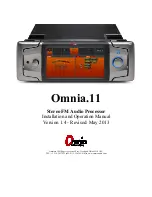
Functional Description
22.3.10.1.2 Transfers Through the Data Port (DAT)
NOTE:
To perform internal transfers through the data port, clear XBUSEL/RBUSEL bit to 0 in the
respective XFMT/RFMT registers. Failure to do so will result in software malfunction.
Typically, you will access the McASP XRBUF registers through the data port. To access through the data
port, simply have the CPU or DMA access the XRBUF through its data port location. Through the data
port, the DMA/CPU can service all the serializers through a single address. The McASP automatically
cycles through the appropriate serializers.
For transmit operations through the data port, the DMA/CPU should write to the same XBUF data port
address to service all of the active transmit serializers. In addition, the DMA/CPU should write to the XBUF
for all active transmit serializers in incremental (although not necessarily consecutive) order. For example,
if serializers 0, 4, and 5, are set up as active transmitters, the DMA/CPU should write to the XBUF data
port address four times with data for serializers 0, 4, and 5, upon each transmit data ready event. This
exact servicing order must be followed so that data appears in the appropriate serializers.
Similarly, for receive operations through the data port, the DMA/CPU should read from the same RBUF
data port address to service all of the active receive serializers. In addition, reads from the active receive
serializers through the data port return data in incremental (although not necessarily consecutive) order.
For example, if serializers 1, 2, and 3, are set up as active receivers, the DMA/CPU should read from the
RBUF data port address four times to obtain data for serializers 1, 2, and 3, in this exact order, upon each
receive data ready event.
When transmitting, the DMA/CPU must write data to each serializer configured as "active" and "transmit"
within each time slot. Failure to do so results in a buffer underrun condition (
Similarly, when receiving, data must be read from each serializer configured as "active" and "receive"
within each time slot. Failure to do results in a buffer overrun condition (
).
To perform internal transfers through the data port, clear XBUSEL/RBUSEL bit to 0 in the respective
XFMT/RFMT registers.
22.3.10.1.3 Transfers Through the Configuration Bus (CFG)
NOTE:
To perform internal transfers through the configuration bus, set XBUSEL/RBUSEL bit to 1 in
the respective XFMT/RFMT registers. Failure to do so will result in software malfunction.
In this method, the DMA/CPU accesses the XRBUF registers through the configuration bus address. The
exact XRBUF register address for any particular serializer is determined by adding the offset for that
particular serializer to the base address for the particular McASP. XRBUF for the serializers configured as
transmitters is given the name XBUFn. For example, the XRBUF associated with transmit serializer 2 is
named XBUF2. Similarly, XRBUF for the serializers configured as receivers is given the name RBUFn.
Accessing the XRBUF registers through the data port is different because the CPU/DMA only needs to
access one single address. When accessing through the configuration bus, the CPU/DMA must provide
the exact XBUFn or RBUFn address for each access.
When transmitting, DMA/CPU must write data to each serializer configured as "active" and "transmit"
within each time slot. Failure to do so results in a buffer underrun condition (
). Similarly
when receiving, data must be read from each serializer configured as "active" and "receive" within each
time slot. Failure to do results in a buffer overrun condition (
).
To perform internal transfers through the configuration bus, set XBUSEL/RBUSEL bit to 1 in the
respective XFMT/RFMT registers.
22.3.10.1.4 Using the CPU for McASP Servicing
The CPU can be used to service the McASP through interrupt (upon AXINT/ARINT interrupts) or through
polling the XDATA bit in the XSTAT register. As discussed in
and
,
the CPU can access through either the data port or through the configuration bus.
3802
Multichannel Audio Serial Port (McASP)
SPRUH73H – October 2011 – Revised April 2013
Copyright © 2011–2013, Texas Instruments Incorporated















































